The Importance of Ongoing Support for Families in Recovery

Introduction: The Gateway to Healing
Addiction not only impacts individuals but also reverberates through the fabric of their families, necessitating a collective approach to healing. Families play a pivotal role in recovery, providing essential emotional, motivational, and practical support that aids individuals in overcoming the challenges of addiction. Understanding the importance of ongoing family involvement highlights how these dynamics shape the recovery process, offering a profound opportunity for healing and transformation.
The Role of Family Support in Recovery
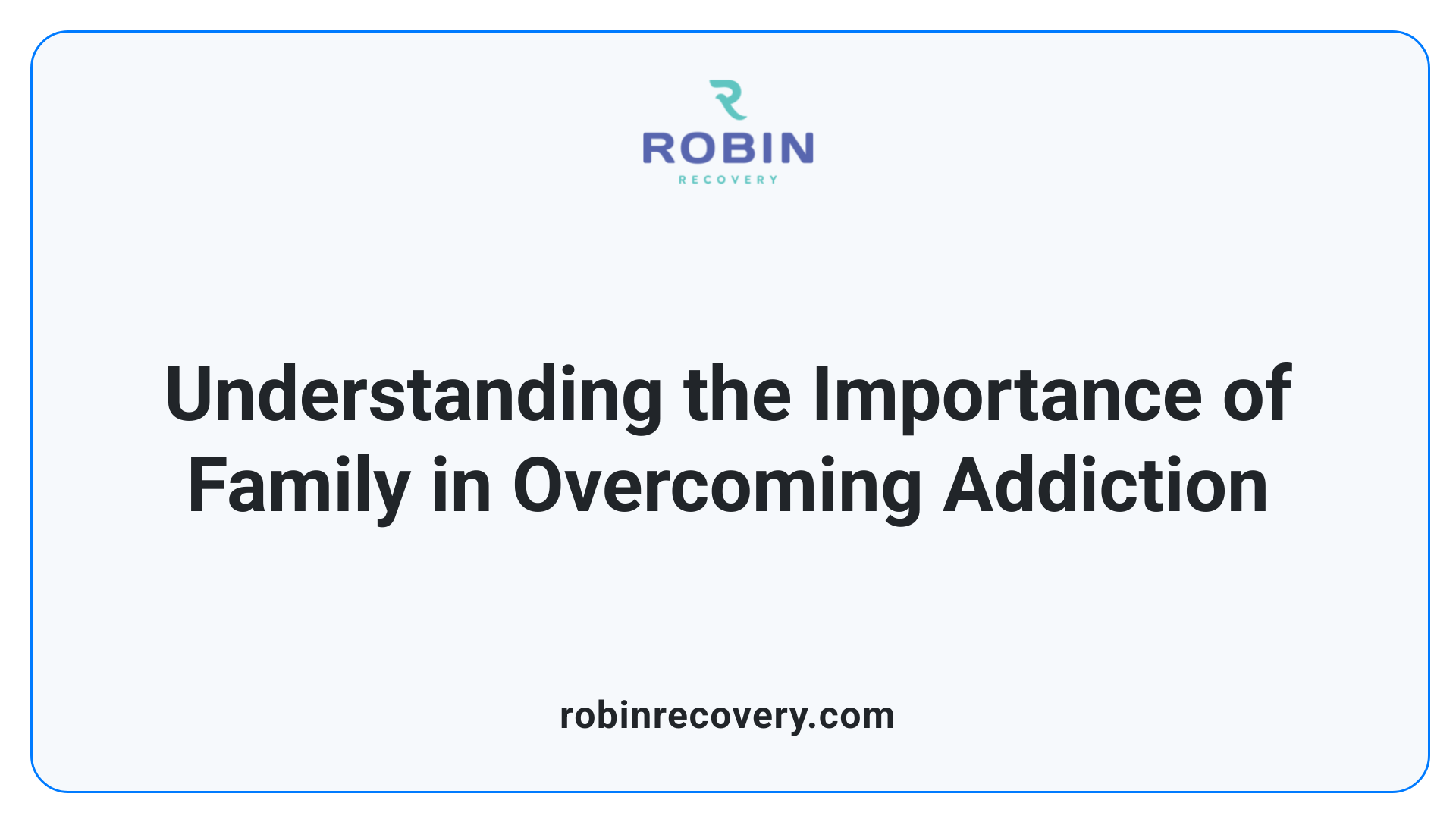
Why is family support important in addiction recovery?
Family support is vital in addiction recovery as it fosters a sense of acceptance and belonging. This is crucial for individuals seeking to overcome the low self-esteem and negative self-image often associated with addiction. When family members actively participate in the recovery process, they can help address barriers hindering recovery efforts. Emotional reinforcement from loved ones encourages individuals to stay committed to their sobriety journey.
However, it’s important to note that family involvement can lead to shifts in family roles. This shift can create stress and potential conflict, especially if caregiving responsibilities become overwhelming. Therefore, educating family members about addiction, including its emotional impacts, is essential. Professional support systems and counseling for caregivers enhance their ability to help their loved ones effectively while addressing their own emotional needs.
What are the emotional benefits of family involvement during addiction recovery?
Family involvement during addiction recovery offers significant emotional benefits that are crucial for long-term success. Supportive family relationships provide a safe environment for individuals to express their feelings, alleviating feelings of isolation and emotional burdens that arise during the recovery journey.
Such involvement instills a sense of hope and courage, which are essential as individuals navigate the complexity of sobriety. Research indicates that a strong family support system significantly enhances recovery outcomes, reducing relapse risks by fostering accountability and guidance. Furthermore, positive family dynamics can create a sense of belonging and community, paramount for emotional well-being throughout recovery.
AspectImpact of Family SupportExamples Emotional Acceptance Fosters a sense of belonging and reduces feelings of isolation. Encouragement during recovery milestones. Accountability Enhances commitment to sobriety through monitored progress. Family members checking in on recovery goals. Hope and Community Provides a supportive atmosphere for emotional health. Families attending therapy or support groups together.
Decoding Family Dynamics in Recovery
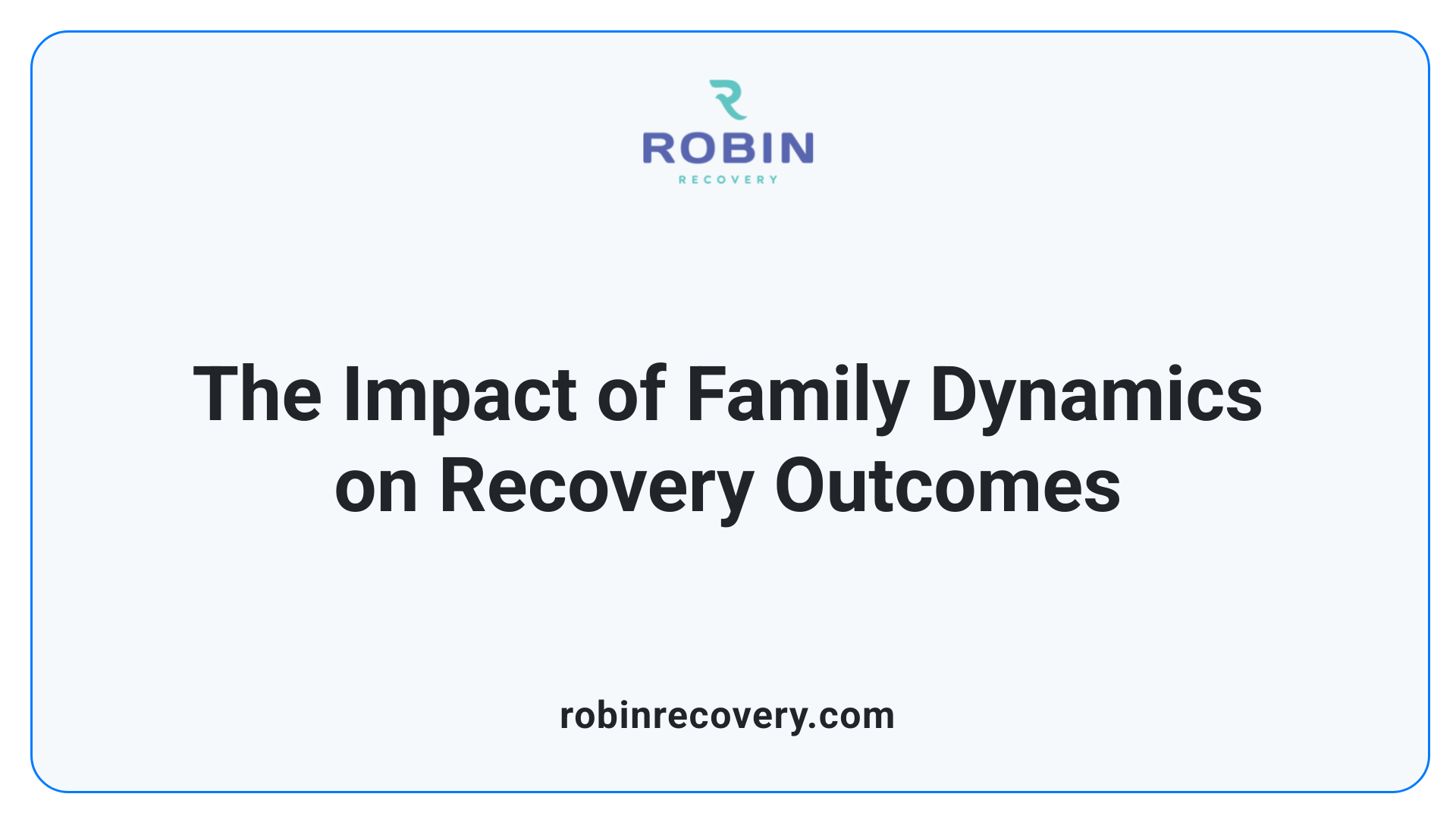
How do family dynamics affect recovery outcomes?
Family dynamics significantly impact recovery outcomes, as addiction is a pervasive issue that affects not just individuals but also their loved ones. This interconnectedness often leads to relational conflicts, emotional strain, and financial challenges. For instance, high levels of conflict, especially with maternal figures, can diminish an individual’s self-efficacy in resisting substance use, emphasizing the vital role that maternal relationships play in the recovery process.
Dysfunctional family roles, such as enablers or scapegoats, frequently emerge in response to addiction, creating an environment that can complicate recovery. If these roles are not identified and addressed, they can hinder the healing process. On the other hand, positive family involvement—through education about addiction, emotional support, and participation in therapeutic interventions—can foster a supportive environment conducive to recovery.
Promoting healthy family dynamics is crucial. A nurturing atmosphere characterized by acceptance and empathy helps individuals feel less isolated and more motivated in their recovery journey. Research indicates that families who actively engage in the recovery process often experience better outcomes, reinforcing the notion that addressing family conflicts is essential for effective recovery from substance use disorders.
Addressing challenges and fostering positive interactions
Addressing challenges within family dynamics is essential for supporting recovery. Effective approaches include family therapy, which not only educates family members about addiction but also improves communication and rebuilds trust.
Fostering positive family interactions starts with open dialogue around feelings and concerns, which can aid in reducing stigma and promoting understanding of addiction as a disease. It’s vital for families to set healthy boundaries that eliminate enabling behaviors while providing encouragement and reassurance.
Utilizing support groups such as Al-Anon and Nar-Anon can also enhance family interactions by connecting individuals with others facing similar challenges. These resources enable families to share experiences and coping strategies, creating a community of support that bolsters both individual recovery and family healing. Ultimately, the interplay between family dynamics and recovery is profound, making it imperative to cultivate a supportive atmosphere for lasting change.
Strategies for Effective Family Support
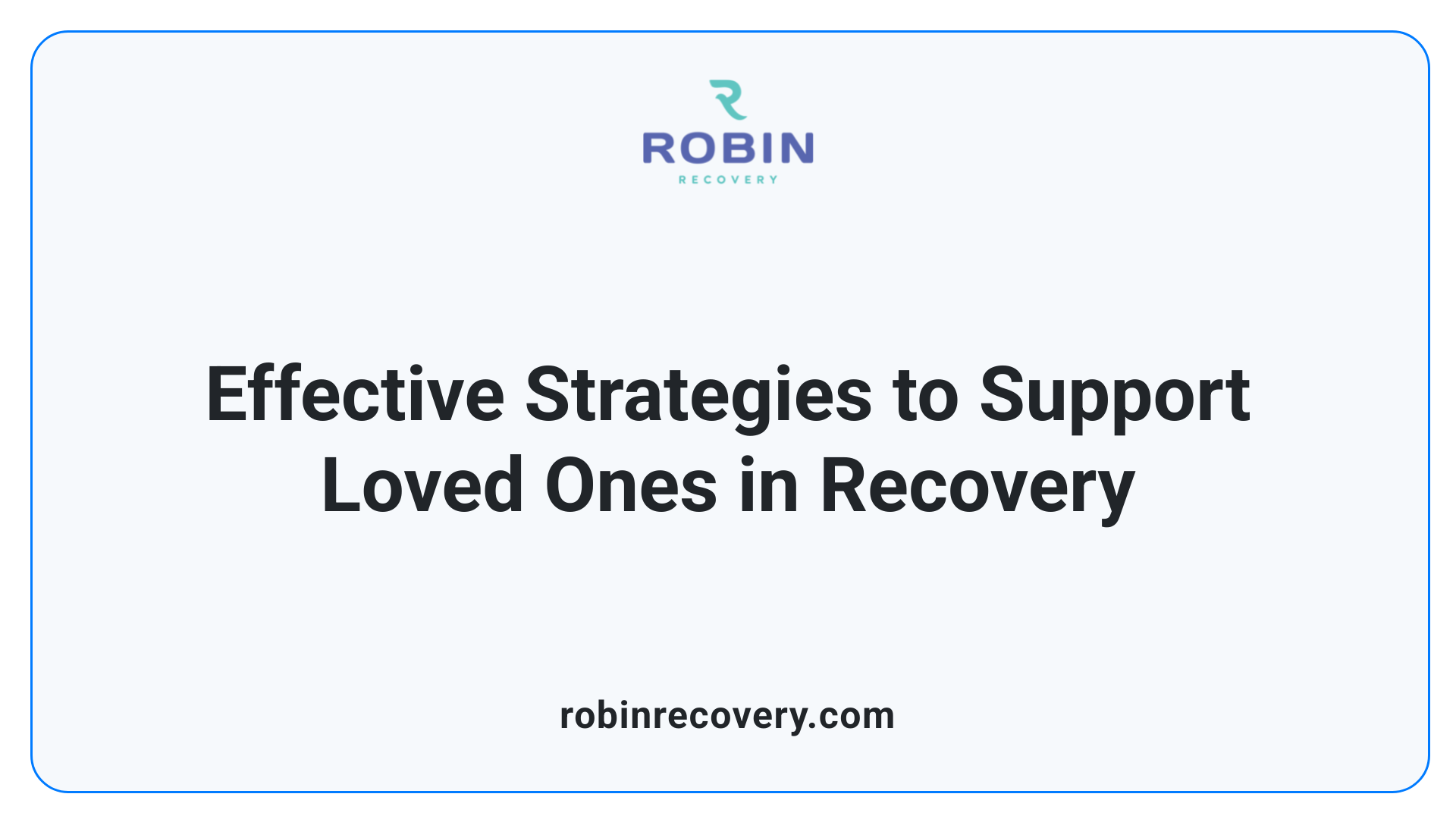
What strategies can families use to effectively support loved ones in addiction recovery?
Families can employ several strategies to effectively support loved ones in addiction recovery. Here are some key techniques:
- Open Communication: Maintaining open communication is vital. Families should emphasize empathy and active listening, fostering a non-judgmental environment where loved ones feel heard and understood.
- Participating in Therapy: Involvement in therapy sessions, particularly family therapy, helps in improving relationships and gaining a better understanding of the dynamics surrounding addiction.
- Educating Themselves: Knowledge about addiction and recovery plays a crucial role. By educating themselves, families can set appropriate boundaries and avoid enabling behaviors, which can undermine the recovery process.
- Support Groups: Joining support groups or programs like Community Reinforcement and Family Training (CRAFT) provides families with emotional and practical support, enhancing treatment adherence and overall recovery outcomes.
- Encouraging Accountability: Families should promote accountability by monitoring progress and helping their loved ones stay committed to their treatment plans.
Importance of Education and Communication
Education and effective communication are essential components of family support in addiction recovery.
- Fostering Understanding: Family education contributes to a better understanding of addiction as a disease, which reduces stigma and builds a supportive environment.
- Enhancing Communication Skills: Teaching families effective communication skills allows them to express concerns positively, enabling better interaction with their loved ones.
- Creating Stability: Open dialogue fosters trust and stability within the family, essential for recovery.
- Setting Healthy Boundaries: Understanding the need for boundaries helps families avoid enabler roles, promoting a healthier dynamic conducive to the recovery journey.
By implementing these strategies, families can significantly enhance their loved one’s recovery process and contribute to a more supportive and nurturing environment.
The Ongoing Need for Support Systems
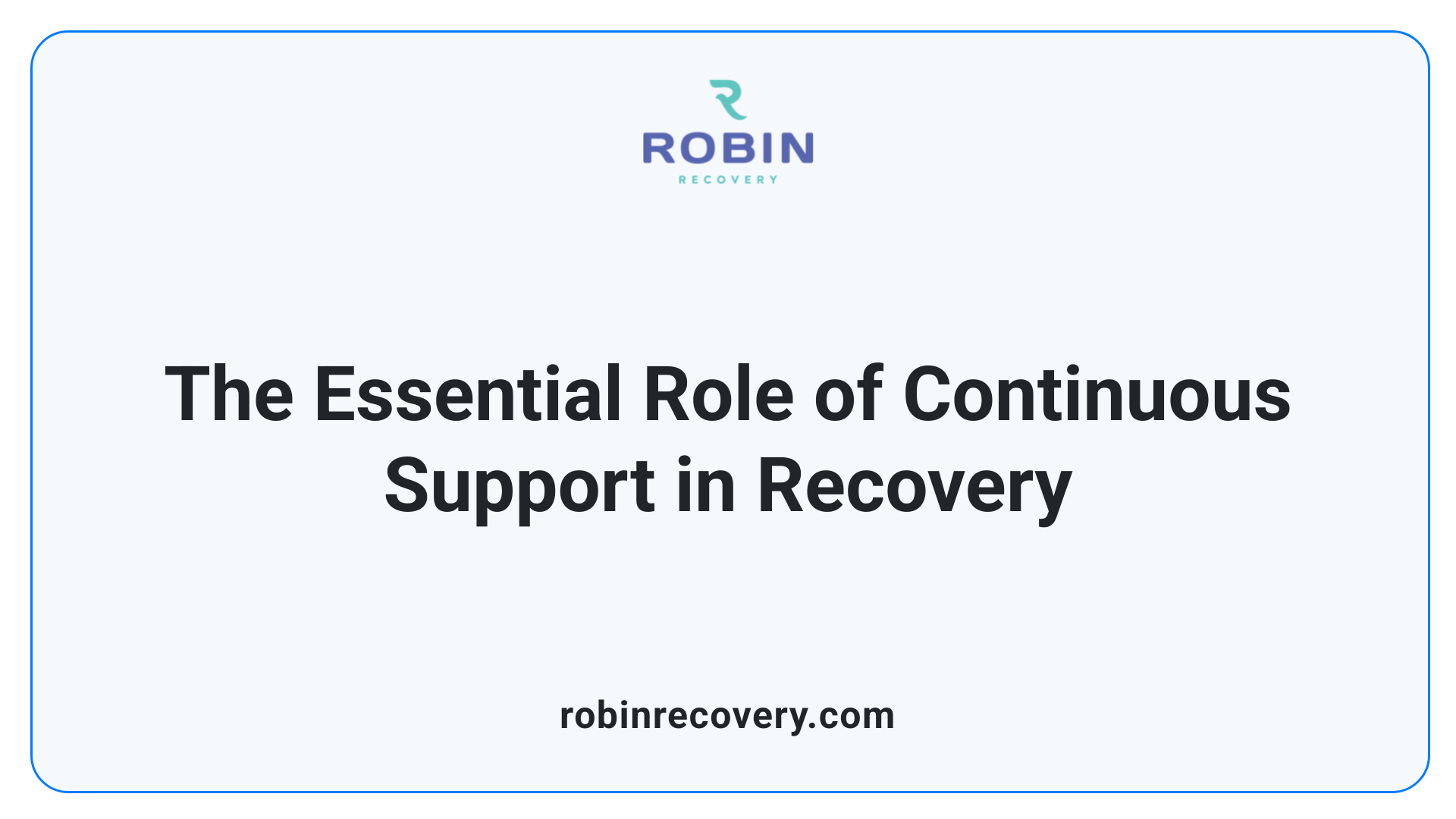
Analyzing the necessity of continuous support
Ongoing support systems play a vital role in preventing relapse during addiction recovery. These systems provide essential encouragement and accountability, ensuring that individuals have someone to turn to during challenging moments.
Support networks, including family members, friends, and mutual-help groups, foster a sense of solidarity and understanding that significantly boosts an individual's motivation to maintain sobriety. Individuals often encounter emotional and mental hurdles along their recovery journey, making it crucial to address these stages early through monitoring and timely interventions. Additionally, ongoing support offers access to resources like therapy and coping strategies that aid in managing triggers and stressors effectively.
Strategies to prevent relapse through sustained engagement
Integrating support systems into recovery enhances long-term outcomes. Family involvement, for instance, aids in establishing healthy communication and boundaries, which are necessary for emotional stability.
Practical strategies to prevent relapse include:
- Regular Check-ins: Frequent contact with supportive individuals to discuss feelings and challenges.
- Encouraging Participation in Groups: Engaging with peers who understand the recovery journey can provide comfort and shared experiences.
- Setting up Accountability Measures: Creating personal goals and having family members or mentors to help monitor progress.
Ultimately, conceptualizing recovery as a lifelong commitment, supported by a solid network, significantly lowers the risk of relapse and fosters lasting sobriety.
Resources and Guidance for Families
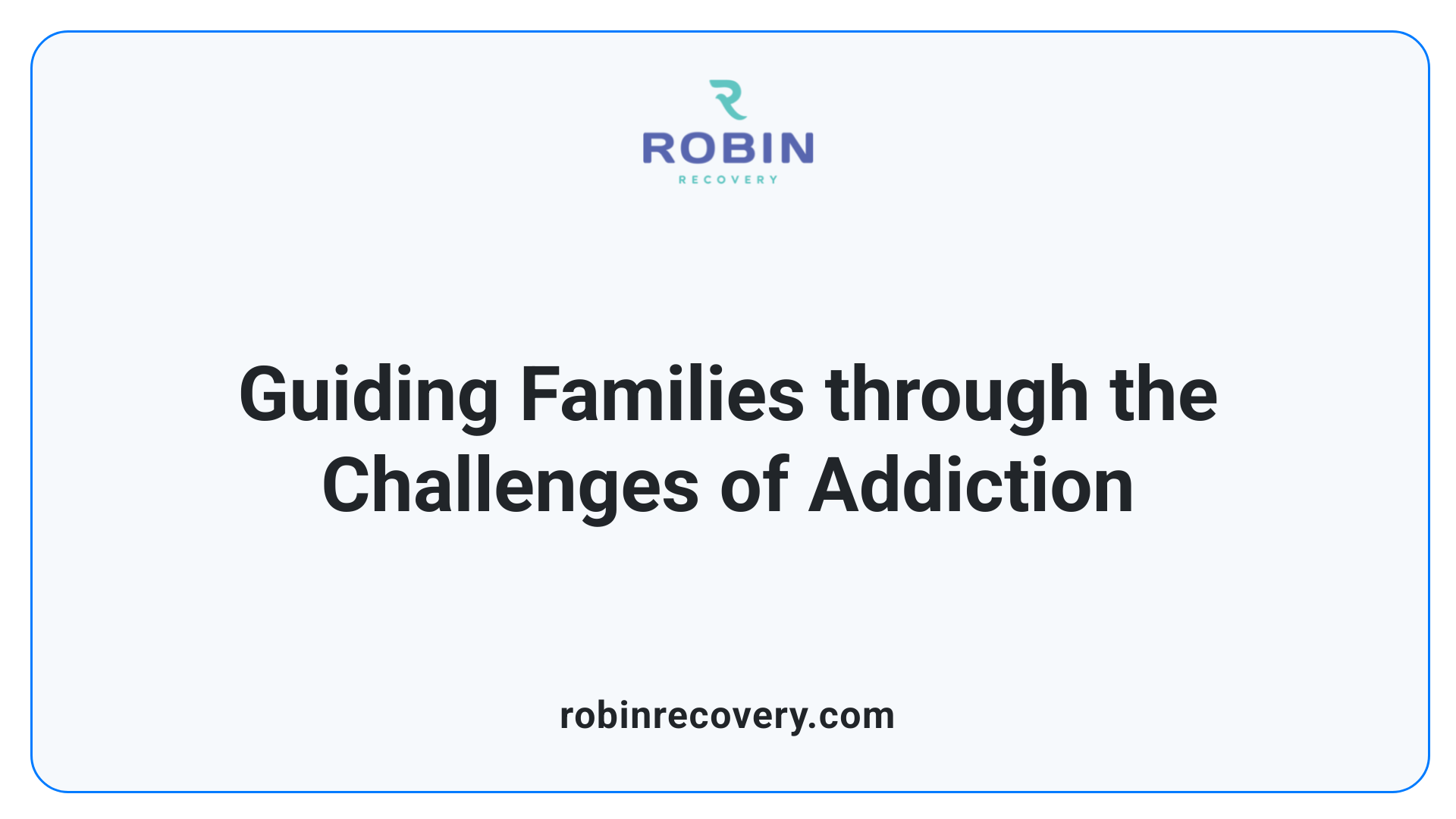
What resources and guidance are available for families dealing with addiction?
Families dealing with addiction have access to a wide range of resources and guidance designed to foster recovery and support. Key options include:
- Family Therapy: This approach focuses on improving communication, rebuilding trust, and promoting healthier dynamics among family members, which is crucial during recovery.
- Educational Workshops: Programs that educate families on addiction can empower them, helping to reduce stigma and providing valuable knowledge on how to support their loved ones effectively.
- Counseling Services: Professional support can guide families through the emotional turmoil that often accompanies addiction, offering coping strategies and emotional relief.
- Mutual Support Groups: Organizations such as Al-Anon, Nar-Anon, and Families Anonymous provide vital emotional and social support, helping families connect with others facing similar challenges.
- Advocacy Groups: The Partnership for Drug-Free Kids, for example, offers helplines and resources for families navigating substance use challenges, enhancing their understanding and approach.
Why is self-care essential for family members?
It’s crucial for family members to prioritize their own health through self-care practices. Engaging in self-care helps families maintain their emotional and physical well-being, ultimately enabling them to provide better support.
Self-care strategies can include:
- Setting healthy boundaries
- Seeking therapy or support groups for themselves
- Participating in stress-reduction activities like exercise or hobbies
- Establishing a strong personal support network
By fostering their resilience and emotional stability, family members can better assist their loved ones on the road to recovery.
Understanding Psychological Impacts on Families
What are the psychological effects of addiction on family members?
Addiction significantly impacts the emotional well-being of family members. It often leads to increased levels of stress, anxiety, and depression, creating a ripple effect throughout the household. The constant worry for a loved one struggling with substance use can result in feelings of helplessness and frustration among family members.
Children of addicted parents bear a heavy emotional burden. They may feel guilt for their parent's struggles and develop dysfunctional emotional attachments, which can perpetuate cycles of substance use disorders into their own adulthood. This reality emphasizes the far-reaching implications of addiction on family dynamics.
Elders and other extended family members, such as grandparents or aunts and uncles, might feel abandoned or anxious as they watch loved ones struggle, further adding to family tension. Financial strains caused by addiction can create a cycle of neglect and conflict within family relationships, often leading to a breakdown of cohesion.
Ultimately, witnessing a loved one grapple with addiction is emotionally taxing, resulting in long-term mental health challenges and strained ties among family members. Engaging in family therapy and support networks can mitigate these psychological effects, promoting healthier dynamics as families navigate the complexities of addiction together.
Integrating Families into Treatment Practices
The Benefits of Family Involvement in Addiction Treatment
Integrating families into addiction treatment practices is essential for improving recovery outcomes, particularly for youth dealing with substance use disorders (SUD). Family involvement has shown to enhance treatment engagement and retention, creating a robust support system that is vital for recovery.
Research indicates that family-based approaches outperform traditional individual-focused therapies. They address the underlying issues contributing to substance use, fostering healthier communication within the family. By participating in treatment, family members can provide emotional support and practical assistance, reducing risks of relapse and promoting sustained recovery.
How Family Integration Can Enhance Recovery Outcomes
Families play a pivotal role in relapse prevention, helping to maintain accountability and develop coping strategies that stave off triggers that might lead to using substances again. Effective family communication fosters understanding and unity, which can significantly bolster motivation and personal commitment to sobriety.
Including families throughout the entire treatment process not only empowers them but also ensures that the individual in recovery has a comprehensive support network to rely on. This ongoing support is crucial, especially in transitional phases after leaving a structured treatment program, as it enhances the likelihood of long-term success against the challenges of maintaining sobriety.
In summary, the involvement of families in addiction recovery is necessary and beneficial, creating an environment where individuals feel supported and understood, ultimately enhancing their chances for a stable and sober future.
The Power of Family Therapy
Exploring family therapy's role and benefits in recovery
Family therapy is a foundational component in the recovery process for individuals struggling with addiction. It addresses the emotional and relational fallout that substance abuse can create within families. By improving communication and understanding among family members, therapy fosters a supportive environment crucial for the individual in treatment.
Participants in family therapy often experience significant benefits such as enhanced treatment retention and engagement. When families actively take part in the recovery process, not only does it lead to better outcomes, but it also makes the individual feel less isolated.
This collaborative approach strengthens family bonds by educating loved ones about addiction, helping them recognize signs of relapse, and empowering them to provide the necessary support.
How therapy fosters healthy family dynamics
Family therapy encourages healthier family dynamics by promoting positive behaviors and emotional well-being. It helps identify dysfunctional roles and communication patterns, which can intensify the challenges of addiction. By acknowledging addiction as a family disease, therapy facilitates discussions that foster mutual understanding and accountability.
Additionally, through structured sessions, families learn to set appropriate boundaries that eliminate enabling behaviors. This promotes not only the individual's recovery but also the overall emotional health of the family unit. Ultimately, family therapy is an essential part of a holistic recovery approach, as it creates a nurturing, understanding, and encouraging environment—all critical for long-term sobriety.
Collaborative Recovery: A Family Affair
How does the collaborative nature of recovery involve both individuals and their families?
The collaborative nature of recovery engages individuals and their families through active participation in the treatment process. This approach is pivotal as it enhances the support systems essential for healing. Families function as valuable resources that provide emotional backing, accountability, and a greater understanding of the complexities related to addiction.
Family involvement plays a vital role across all phases of substance use disorder (SUD) services. From identifying problems through to sustaining recovery, having family members engaged is linked to improved recovery outcomes. Family therapy fosters open communication, addressing underlying issues and nurturing healthy family dynamics, which are crucial for rebuilding relationships and promoting empathy.
Furthermore, family members can help recognize relapse triggers and encourage adherence to treatment through consistent accountability. By creating a nurturing environment, the family not only supports the individual’s commitment to sobriety but also facilitates a more profound bond that fosters long-term recovery and stability. This collaborative model is increasingly recognized as a best practice in addiction treatment, highlighting the importance of understanding addiction as a familial, rather than solely an individual challenge.
Ultimately, a robust family-oriented approach cultivates not just individual healing, but also enriches the emotional landscape necessary for sustained recovery, leading to healthier family dynamics that can thrive throughout rehabilitation and beyond.
Community Support Networks
The role of external support systems and community groups
Community support networks play a pivotal role in addiction recovery, providing vital resources and connections that individuals need to succeed. These networks often include local support groups like Alcoholics Anonymous (AA) and Nar-Anon, which offer peer support and guidance for those in recovery and their families. By participating in these groups, individuals gain access to shared experiences and knowledge that can help them navigate the challenges of sobriety.
Support groups serve as platforms for accountability, creating a community where individuals can share their struggles and victories. This network fosters a sense of belonging and reduces feelings of isolation, which are common during recovery. Furthermore, they can help family members understand the addiction journey, empowering them to support their loved ones more effectively.
Helping families and individuals sustain their recovery journey
Community resources also extend to family education and support, which are crucial in maintaining recovery. Local organizations often provide workshops and counseling sessions that teach families about the nature of addiction, effective communication strategies, and coping mechanisms. Educated family members are better equipped to navigate the complexities of supporting a loved one in recovery.
Additionally, community programs can connect families to services that address practical needs, such as transportation to therapy or meals, alleviating daily stressors that might hinder recovery efforts. Overall, community support networks serve as a lifeline for individuals and families alike, reinforcing their recovery journey and enhancing long-term sobriety outcomes.
Conclusion: Fostering Family Resilience
Family involvement in addiction recovery is an enduring commitment that profoundly shapes the recovery landscape. By fostering supportive environments through education, therapy, and continuous engagement, families help create sustainable paths to sobriety for their loved ones. As families navigate this journey, addressing their own psychological needs while providing steadfast support becomes essential. The collaborative effort between individuals, their families, and broader community networks ensures that recovery is an achievable and sustainable objective, nurturing hope, resilience, and healing.
References
- The Importance of Family Support in Addiction Recovery
- The Role of Family and Friends In Addiction Recovery
- Family Involvement in Treatment and Recovery for Substance Use ...
- Why Is Family Support So Important in Recovery?
- Why Aftercare & Ongoing Support is Crucial to Recovery
- The Importance of Family Education in Recovery Support
- Family Roles in Addiction & the Importance of Family Support in ...
- The Importance of Family Support in Local Addiction Recovery
- Resources for Families Coping with Mental and Substance Use ...
